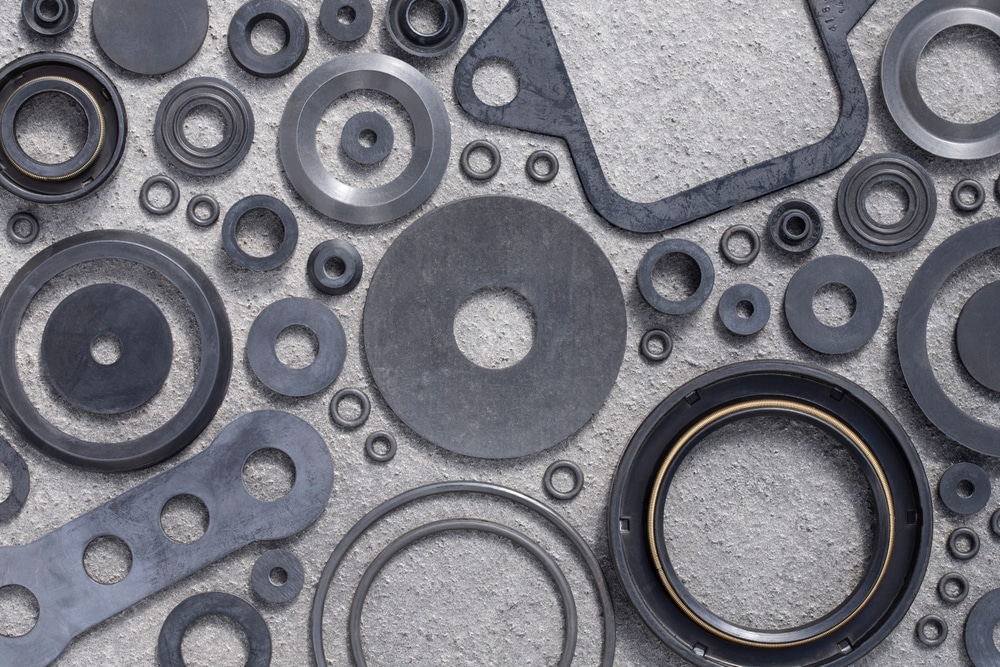Allied Metrics Seals & Fasteners, Inc. is a leading manufacturer and distributor of high-quality seals, and one we specialize in is gaskets. These are found everywhere, and numerous industries rely on them in their daily operations as it’s present in many types of machinery, systems, and equipment.
We utilize a cutting-edge gasket maker to deliver the latest innovations that can improve our customer’s bottom line. We also provide custom services for projects requiring specific gasket shapes and sizes manufactured in our fully equipped in-house facility.
Molded Gaskets
Molding is an excellent option for mass production of gaskets with exact dimensions and little need for finishing. To create rubber gaskets in this fashion, liquid rubber is injected into a mold at high pressure and allowed to cool into the desired shape. This form of production ensures higher precision and allows for more cost-effective mass production.
Extruded Gaskets
Gaskets that are created through extrusion are forced through a die to create the desired shape. The rubber used in this process must be soft enough to be easily shaped, so finishing processes such as vulcanizing and curing are performed after the gaskets are cut. Extrusion is more cost-effective than other gasket manufacturing processes, as it is easily automated and the base material can be continuously pushed through the extruder.
Die Cut Gaskets
Die cut gaskets are similar to extruded gaskets in that the shape of the gasket is cut from the base rubber material, but the gaskets are cut from a flat sheet of rubber using a die to produce the desired shape. This process is easily automated and reduces waste, as a die cutter can be used to create a number of different shapes at the same time from the same sheet of material.
Waterjet Gaskets
Waterjet production of gaskets uses water ejected at extremely high pressure to cut the rubber. Like die cutting, waterjet manufacturing cuts the shapes out of a large flat sheet of rubber. The process can be used to cut harder materials with very precise details and is capable of cutting multiple shapes at the same time, thereby reducing material waste.
High Temperature Gaskets
High-temperature gaskets are specialized gaskets that are engineered to withstand extreme temperatures (up to and exceeding 2300° F) without suffering from thermal damage or degradation. As such, they are ideal for use in critical sealing applications involving high-temperature process fluids or environmental conditions.
What is a Gasket?
Gaskets are seals that hold two things together. They are primarily made from rubber and plastic but are also available in metal materials, depending on their intended purpose.
Although they are often used interchangeably with “seals,” they have different purposes. While gaskets protect two unmoving parts, seals safeguard moving parts, which can either be one or both.
These elastomeric components have a broad scope of purposes due to their functionality. Some of these are as follows:
- Anti-vibration
- Noise and sound reduction
- Packaging
- Hygiene
- Sealing
A gasket seal can be found in numerous sectors due to its versatility. It also comes in different types: molded, extruded, high-temperature, waterjet, and die-cut. These are the various ways a gasket is made, which we offer here at Allied Metrics.
Typical Applications of a Gasket
Gaskets are present in many industries, but a suitable material must be highly considered to ensure they perform up to par. For instance, rubber gaskets are ideal for more flexible and durable applications.
With that said, below are some industries that utilize these sealing components and their common applications.
- Food processing: A rubber gasket can be found in mixers, packaging, extrusions, cooking vessels, and processing equipment, to name a few.
- Pharmaceutical: Some typical pharmaceutical gasket applications are fermenters, bioreactors, flanges, valves, and many more.
- Petrochemical: Gaskets are also employed in the petrochemical sector, such as in pipelines, tongue-and-groove flanges, and valves.
- Water and gas: Gaskets can prevent leaks in engines, pumps, compressors, and different types of pipework.
- Chemical: The primary use of gaskets in chemical processing is to protect workers from exposure to hazardous chemicals from leaks.
The easiest way to determine if a piece of equipment needs a gasket is to think that if it doesn’t move but requires sealing, it’s most probably using a gasket!
Ideal Properties of a Gasket
Since gaskets are used as a sealing component between two non-moving joints, it has to have specific properties that make it suitable for the job. Below are some things to consider:
- It must withstand abrasion, vibration, and impact
- Resist corrosion even when exposed to extreme environments and temperatures
- High tensile strength and flexibility
- Possesses internal pressure and durability
- High enough resilience to withstand stress and prevent deformation under any conditions
Choose Us to Deliver Superior Quality Gaskets
With our reputation as one of the most trusted sealing system providers, you can rest assured that we have the best products for the job. Our selection of gaskets is known for their excellent performance and affordability, giving you value for your money.
If you have questions or concerns about our products, don’t hesitate to contact us today. You may also request a quote for larger or more complex projects, and we’ll work on a solution that will drive your project’s success.


